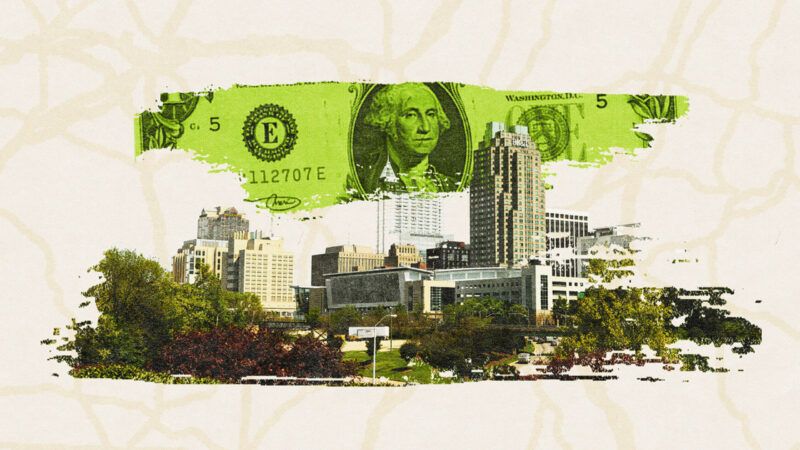Crony Capitalism Is Apparently Business-Friendly
North Carolina wins "America's Top State for Business" by picking winners and losers.

It seems that in North Carolina, cronyism is a bipartisan virtue.
A new report by CNBC lists North Carolina as America's Top State for Business, based on a wide range of metrics. The site, which has compiled the list annually since 2007, noted the Tar Heel State has finished in the top 10 nearly every single year, coming in a close second for 2021. As for what put it over the top this year: "state leaders keep managing to put aside their very deep political divisions to boost business and the economy."
The article goes on to extol the virtues of North Carolina's current exercise in divided government, in which Democratic Gov. Roy Cooper and a Republican-dominated General Assembly have worked together to craft financial incentives intended to lure companies to the state. Most recently, the article cites a deal from March in which VinFast, a Vietnamese electric vehicle manufacturer, will build a $2 billion factory in North Carolina's Chatham County, in exchange for $1.2 billion in subsidies. Additionally, the article lists a deal from 2021 in which Apple agreed to build "its first East Coast hub" in exchange for incentives totaling up to $846 million.
But despite CNBC's breathless praise, these types of deals have downsides.
In exchange for that $2 billion investment, the state had to agree to over $316 million in "reimbursement" to the company over 30 years, equaling 90 percent of the state income taxes withheld from its employees over that time. It also agreed to $450 million "to cover site preparations, road improvements, and additional water and sewer infrastructure." Additionally, Chatham County chipped in "over $400 million" in additional subsidies.
It's unclear why a company that is currently pursuing an IPO valuing itself at $60 billion would need that kind of help.
Meanwhile, the Center for Economic Accountability, which opposes corporate welfare, ranked North Carolina's deal with Apple as 2021's "Worst Economic Development Deal of the Year." The think tank cited, among other factors, the decision to remove nearly a billion dollars of taxpayer funds from state and county coffers in order to court a company that "has more money than North Carolina does."
Such lopsided deals are not uncommon. Typical beneficiaries include sports franchises, which despite being worth billions often receive hundreds of millions in taxpayer-funded subsidies to build new stadiums, even when existing stadiums are doing just fine. Last month, Charlotte approved a $215 million subsidy toward renovating the stadium used by the Charlotte Hornets. The city plans to fund the difference through increased taxes on rental cars and hotel rooms, but according to J.C. Bradbury, an economist from Georgia's Kennesaw State University, "The Charlotte Hornets do not bring a lot of tourism to Charlotte whatsoever." Any funds not recouped through the extra taxes will simply be borne by the city's residents.
Perhaps the most galling example is Wisconsin's Foxconn plant, announced in 2017 by then-Gov. Scott Walker. In exchange for the tech giant spending $10 billion on a factory which would employ over 13,000 people, the state pledged $3 billion in state subsidies, including $1 billion from the nearby town of Mt. Pleasant. Four years later, the company admitted that it would ultimately invest less than $700 million, and employ fewer than 1,500 people. The state was able to rescind and recoup most of the tax subsidy, but Mt. Pleasant had already seized and bulldozed homes and taken on hundreds of millions in debt in preparation for the factory. Ultimately, the town's credit rating was downgraded.
There are plenty of things that a state can do to entice businesses, like streamlining its tax code or modernizing its infrastructure. But by doling out taxpayer dollars to companies as an incentive, state governments subvert the market and set their citizens up to foot the bill for anything that goes wrong. As the Tax Foundation wrote in 2006, "targeted tax preferences…may provide short-term economic stimulus, but ultimately they increase tax complexity and compliance costs, encourage costly industry rent seeking, and raise tax burdens elsewhere in the economy."
